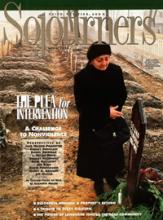After receiving the Nobel Peace Prize in December, Rigoberta Menchu was accompanied on her return to Guatemala by an international delegation that included Joe Nangle, O.F.M., the outreach director of Sojourners when this article appeared. Nangle's reflections on the return follow.
-- The Editors
The Nobel Prize didn't make it home with Rigoberta Menchu. Prior to leaving Mexico City for our flight to Guatemala, Rigoberta entrusted the peace medal and scroll to the Mexican government. She explained that this act did not signify an attitude of disrespect for her country of origin. Rather, she said, the medal is passing through a time of "vigil," awaiting the day when Guatemala's human rights conduct permits its return there. Such a not-so-subtle statement of truth to the powerful of her country reminded me of another peasant woman many centuries ago and half a world away who prayed to a God who "has deposed the mighty from their thrones and raised the lowly to high places."
Accompanying Rigoberta Menchu on her return to Guatemala as a Nobel Peace laureate made possible the best sort of theological and biblical reflection, the kind that flows from such real life experience as hers.
Rigoberta's enabling message to her people, spoken in their native language, gave renewed meaning to the words, "I have been sent to bring good news to the poor." In promising a group of diplomats at the French Embassy in Guatemala City that she would take seriously her nomination by U.N. Secretary-General Boutros Boutros-Ghali as the U.N. goodwill ambassador during this Year of Indigenous Peoples, she provided a modern context for Isaiah: "A people in darkness have seen a great light."
Read the Full Article

